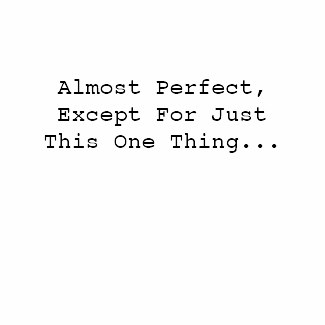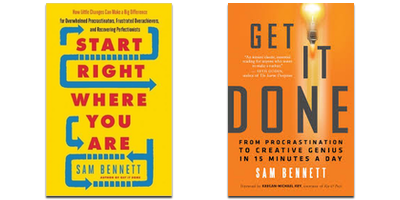
You’re Just Never Satisfied, Are You?
Almost Perfect, Except For Just This One Thing… by samanthabennett222
Create a Customized T Shirt At Zazzle
See more Words To Live By T-Shirts “>Just A Little Divine Dissatisfaction
JUST A LITTLE DIVINE DISSATISFACTION
You’re never satisfied, are you?
Even when something is great, you are always thinking that it could be just a skotch better.
You are always revising.
Your whole life is brief, fleeting moments of satisfaction that only serve to punctuate the endless wash of “if only.”
The grass is not only greener on the other side, it is richer, thinner and better-looking as well.
You just can’t leave well enough alone, can you?
Guess what: nobody can.
Human beings are especially designed to be dissatisfied. We are in a near constant state of dissatisfaction. Dissatisfaction is what we do best. Our brains are constructed to be always ticking along, thinking, “How could this be better?”
And, perhaps more importantly, “How can I be better?”
We are always seeing something that isn’t there and wishing that it was. And artists are more dissatisfied than anyone else.
Artists are better than anyone at seeing a new solution, a new means of expression, a new version of perfection. Artists specialize in seeing what’s not there. Out of nothing, artists create something.
This nothing-into-something business is what people talk about when they talk about miracles, and artists do that sort of miracle more often than most. Of course, mothers and fathers do it, too – that’s why we call it the “miracle” of birth.
Talk about nothing into something: first there was nothing and now there’s a whole new person in the world! And good cooks do it, naturally. And gardeners. And children do it constantly.
So this chronic dissatisfaction you are feeling is not a bad thing. It is Divine Dissatisfaction. It is the restless spirit of creativity calling you to action. You are being called to create. You are being called to reveal the miracle within you.
So, next time you feel like you are an empty well under a clear blue sky, remember: There’s Nothing Wrong With A Little Divine Dissatisfaction.
What are you divinely dissatisfied with today? And what do you think you might do about that?
By the way, you may buy the shirt above by clicking here.

Today I Want To Introduce You To A Fun Experiment…
“I just SAW my project as A big chocolate chip cookie! It was real and sweet”
– Anna, Gilbert, AZ
This is a “first-thought = best thought” exercise, and so there’s no right or wrong way to do it so just stay loose and let the answers to the questions bubble up from the bottom of your belly.
I know some people have a hard time “visualizing,” and if you are one of those people, no worries – just see if these questions spark anything for you.
Step One: Plug In To Your Intuition
First, get into a comfortable position and take a few deep breaths to clear your mind and plug in to your intuition.
Once you are feeling focused and relaxed, allow an image of your project to appear in your mind.
This image might be sort of abstract, or perhaps it’s literal or maybe some of both. Whatever jumps to mind first is perfect, even if it seems a little weird : )
Step Two: Noticing Your Project’s Unique Image
Holding this image of your project in your mind’s eye, ask yourself the following questions:
What does your project look like?
Does it have a shape? A color?
Is it shiny? Dull? Sharp-edged? Soft?
Reach out and touch it – what happens?
Does it glow? Does it move when you touch it? Does it bend?
Notice some of the special details – whatever it does or doesn’t do.
Step Three: What Does Your Project Want To Tell You?
Now listen carefully – does your project have anything to say to you? Let it speak. Don’t argue – just listen.
Good.
When you’re ready, take another deep breath to ground yourself again, and make some notes about what you noticed.
Share below what your project told you. I would love to know!
Whatever you learned today about your project, I hope it’s information that will move you forward –
Because The World Needs Your Good Work

Finding the Sexual Voice: a Webinar with Amy Jo Goddard
It’s really hard to ask for what you want in sexuality and relationships if you don’t know what to ask for, or how to start the conversation.
In our sex-negative culture, what would it mean to express your authentic sexual voice?
Many people don’t know how to talk about sexuality because they have no idea what they want.
Many don’t know how to have a conversation with others because they are so confused in their conversation with themselves, stuck in self-judgment, confusion, frustration or thinking something is wrong.
My friend and colleague Amy Jo Goddard does amazing work as a sexual empowerment expert and teacher and she is hosting this webinar on 2/24 on “Finding the Sexual Voice”.
We all have a sexual voice. Some of us need to find it, some of us need to express it, some of us need to shift it so we can get more of what we want and less of what we don’t.
In this 90-min webinar, you will learn:
- the difference between the internal and external sexual voice…
- the top sexual stories that get people stuck…
- what gets in the way of finding your true voice and inner “Yes”…
- steps you can take to tap into that inner Yes…
- how to bring your inner Yes into the outer world so you can get more of what you want in sex and relationships…
I support her message and I hope you will sign up and share.
TWITTER – include link to https://cc100.isrefer.com/go/voice/sbennett
.@AmyJoGoddard is teaching a webinar on 2/24: “Finding the #SexualVoice.”
How can you tap into the power of your unique #SexualVoice? A conversation with @AmyJoGoddard
It’s hard to talk about sexuality when you don’t know what you want. @AmyJoGoddard’s webinar on 2/24:
My friend & colleague @AmyJoGoddard is teaching this webinar on 2/24: Finding the #SexualVoice
.@amyjogoddard is on a mission to banish sexual voicelessness — please join!

Let’s Go Fishing!
Fishing for trout is like having a career in the arts.
Why?
Because while good equipment can help, it’s no guarantee that you’ll catch anything.
And just because you caught something yesterday doesn’t ensure that you’ll do it again today.
Or ever.
Amateurs can often do just as well as pros, and children can often beat them both.
And in the end, if you are going to fish, the reward mustn’t be the fish, or even the promise of fish.
The reward must be found in the process of standing on the shore in all kinds of weather, loving each cast.
A 2-Minute Treat for You — watch this and play along —
As a special treat, we’ve made you this super-fun 2-minute movie that’s all about how to slay the dragon of your procrastination : )
Please share it with your family, friends, kids, colleagues, and social media buddies.
There’s nothing to sign up for or register — it’s just a gift designed to stimulate your creativity and have a little fun.
With wishes for a joyful, creative Thanksgiving to all our US friends and a big kiss for everyone else —

